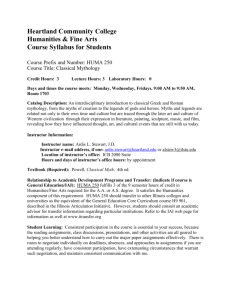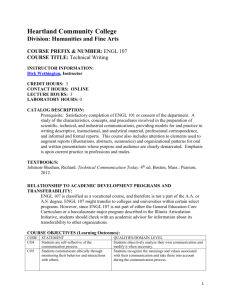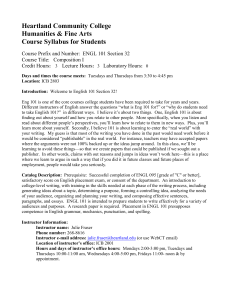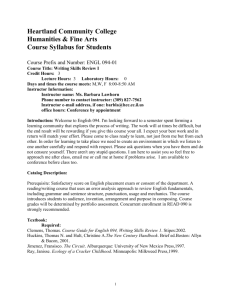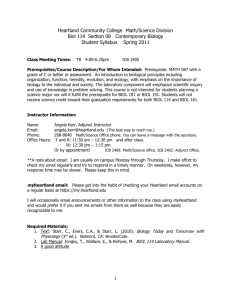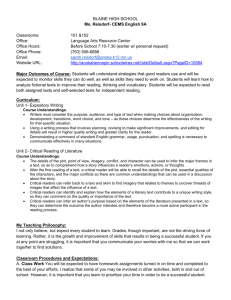huma25003 - Heartland Community College
advertisement
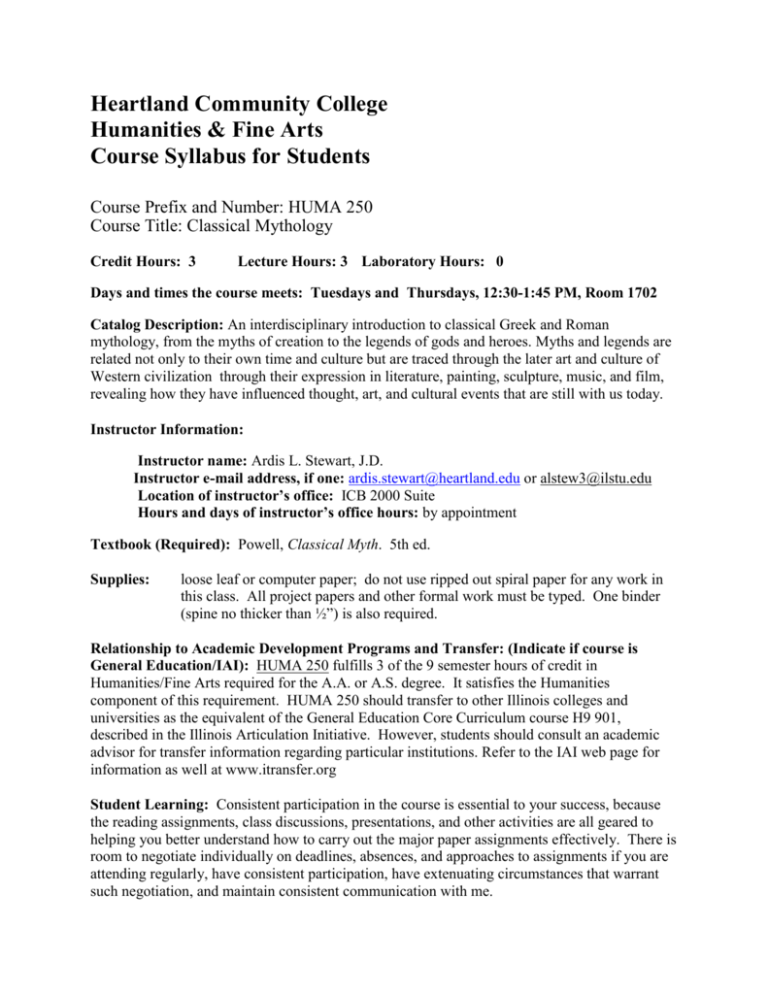
Heartland Community College Humanities & Fine Arts Course Syllabus for Students Course Prefix and Number: HUMA 250 Course Title: Classical Mythology Credit Hours: 3 Lecture Hours: 3 Laboratory Hours: 0 Days and times the course meets: Tuesdays and Thursdays, 12:30-1:45 PM, Room 1702 Catalog Description: An interdisciplinary introduction to classical Greek and Roman mythology, from the myths of creation to the legends of gods and heroes. Myths and legends are related not only to their own time and culture but are traced through the later art and culture of Western civilization through their expression in literature, painting, sculpture, music, and film, revealing how they have influenced thought, art, and cultural events that are still with us today. Instructor Information: Instructor name: Ardis L. Stewart, J.D. Instructor e-mail address, if one: ardis.stewart@heartland.edu or alstew3@ilstu.edu Location of instructor’s office: ICB 2000 Suite Hours and days of instructor’s office hours: by appointment Textbook (Required): Powell, Classical Myth. 5th ed. Supplies: loose leaf or computer paper; do not use ripped out spiral paper for any work in this class. All project papers and other formal work must be typed. One binder (spine no thicker than ½”) is also required. Relationship to Academic Development Programs and Transfer: (Indicate if course is General Education/IAI): HUMA 250 fulfills 3 of the 9 semester hours of credit in Humanities/Fine Arts required for the A.A. or A.S. degree. It satisfies the Humanities component of this requirement. HUMA 250 should transfer to other Illinois colleges and universities as the equivalent of the General Education Core Curriculum course H9 901, described in the Illinois Articulation Initiative. However, students should consult an academic advisor for transfer information regarding particular institutions. Refer to the IAI web page for information as well at www.itransfer.org Student Learning: Consistent participation in the course is essential to your success, because the reading assignments, class discussions, presentations, and other activities are all geared to helping you better understand how to carry out the major paper assignments effectively. There is room to negotiate individually on deadlines, absences, and approaches to assignments if you are attending regularly, have consistent participation, have extenuating circumstances that warrant such negotiation, and maintain consistent communication with me. You will need to spend at least six hours per week outside of class on work for this course. The actual number is determined by your preparation, attitude, getting your questions answered, and your personal goals. Instructor’s Role: I facilitate interaction among students in various ways in order to help each of you achieve effective analytical, evaluative, and rhetorical abilities. I provide a broad context in which each student constructs a place to work with respect to his or her own interests. Moreover, if you need more support to learn, let me know so I can help you find tutorial, library, reading, study skills, time management, or other assistance programs. Course Objectives (Learning Outcomes): After completing this course, a student should be able to: 1. Identify the principal gods, goddesses, heroes, and heroines of Greek and Roman mythology. 2. Recognize some of the major artists and works of literature, painting, music, and sculpture that have employed mythological themes and subjects. 3. Understand the various ways that classical mythology has shaped the thinking and institutions of the contemporary world. 4. Recognize and define such terms as hamartia, in medias res, Dionysian, metamorphosis, Hellenistic, and others. 5. Articulate and communicate the major themes and ideas found in classical mythology, showing the continuity between ancient thought and the present time. Course/Lab Outlines: 1. Myths of Creation 2. Cronos and the Titans 3. Zeus' Rise to Power 4. Zeus, Hera, and Their Children 5. Deities, Divinities, and Monsters 6. Athena 7. Aphrodite and Eros 8. Artemis and Apollo 9. Hermes and Dionysus 10. Hades and the Afterlife 11. The Theban Saga 12. The Trojan Saga 13. Odysseus 14. Hercules 15. Perseus and the Legends of Argos 16. Theseus and the Legends of Attica and Crete 17. Jason and the Argonauts Method of Evaluation (Tests/Exams, Grading System): Student assessment is based on the following: Exam #1: Exam #2: Exam #3: Exam #4: Exam #5 and “Final”: (you must be present for the “final” for Exam 5 to count) Research paper: Prospectus (10%) Final Draft and copies of sources(90%) Short paper #1 (3 pages): Short paper #2 (2 ½ pages): Short paper #3 (4 pages): Class preparation and participation, quizzes, and assignments Grades 10% 10% 10% 10% 10% 20% 5% 5% 5% 15% will be determined according to the following scale: 92 to 100 = A 83 to 91 = B 74 to 82 = C 65 to 73 = D Below 65 = F Participation (or Attendance): Class participation is required. “Participation” means more than being present in the classroom at the appointed time. Every class session has a participation and preparation grade. Absence results in zero participation points for the day, because class discussions, hearing and visual presentations, and so forth are impossible to make up. The same goes for working on other projects, or snoozing during class. There are no “excused” absences (only “explained” absences). One or two absences will not significantly affect your grade, if the rest of your performance is satisfactory. If you must miss class, bring any written assignments due during the class period that you are absent to the HFA office (ICB 2000) and place them in the drop box in front of the secretary’s desk (to the left as you walk in) before the due date and time. Do not rely on e-mailing your paper as an attachment—sometimes the attachment is garbled, sometimes there is no attachment, sometimes there is no e-mail. If I do not receive it, or I cannot read it, it isn’t turned in. Chapter assignments must be in my mail box or e-mailed to me by noon the day the assignment is due (this will be on the assignment sheet) in order for you to receive preparation credit on days you are absent. Any assignments started during the class period in which you are absent are due when everyone else’s is. Therefore, talk to me about planned absences in advance and call me or e-mail me as soon as possible if you miss class unexpectedly. In any case, all assignments must be completed satisfactorily in order to pass the course. Medical verification of illness or other proof of need for absence (these are “explained” absences) will make me more flexible in negotiating acceptance of late assignments or make-up. In any case, students must initiate negotiation of make up work upon their return to class or over e-mail. In case of illness or family emergency that requires missing more than one class, I expect that you communicate early in the absence so make up arrangements can be pre-arranged. Excessive absences for any reason create an obstacle to completion of the course. Without regular communication from and with you to negotiate changes in deadlines during these absences, progress in, and thus completion of the course is impossible. It is impossible to re-teach extensive parts of the course. Incompletes: I follow the official college policy, as found in the college catalog, as illustrated by the following excerpt: “An incomplete grade may be given to a student who, by the withdrawal date, can reasonably be expected to pass the course. Incompletes may be granted only when justified by extreme circumstances (e.g. serious illness, accident, death or serious illness in the immediate family).” Make-up of tests and assignments: I reserve the right to negotiate with students over make up and the excuse of absences. Late work, whether or not due to absences, unless negotiated with me as in the cases explained above, will receive a zero. If negotiated make up schedules are not kept, the work receives a zero. Leaving for vacation, because a lease is expired, etc., are not reasons to take an exam early. Students with housing leases should make arrangements to extend their leases, to make alternative housing arrangements, or to commute during the final exam period. Deadlines: Deadlines can be negotiated with me, but unless the deadlines are negotiated, all late work will result in zeros. Papers and assignments due in a missed class should be dropped off in Room 2000 as soon as possible. Required Writing and Reading: Research paper: Students will write one prospectus (½ -1 page-due September 21) in connection with one long paper (7-9 pages-due November 21) presenting the results of students' independent library research. The paper will focus on the importance of classical myth in modern culture. Students should cite from at least 6 sources, and all citations should follow the MLA Handbook for Research Papers. Internet sources are not acceptable without my prior permission. Textbooks, dictionaries, encyclopedias, and study aids (like Cliff Notes) are not acceptable as sources. Students should write in a formal style for an academic audience who is familiar with the work of literature. Short Papers: Students will also write three shorter papers ( 2 ½ to 4 pages each, depending on paper, due September 21, October 24, and December 5). Details on the papers will be forthcoming. Student Conduct: Students should come prepared by having read the readings assigned for that class and given out the class before and by bringing assignments to class. The emphasis on this class is maintaining an atmosphere conducive to learning. When you are late, arrive quietly. If you leave early, depart gracefully and quietly. During presentations, listening to the presenter is a form of participation. Differences in perspective, values, and beliefs will surface in classroom discussions, classroom activities, and presentations. The free exchange of ideas is encouraged, but intimidating or disrespectful language and behavior have no place in such exchanges. Refer to the Democratic Ethic description in the Course Guide and the College policies in the Heartland Community College Handbook. Academic Integrity: Academic integrity is a fundamental principle of collegial life at Heartland Community College and is essential to the credibility of the College’s educational programs. Moreover, because grading may be competitive, students who misrepresent their academic work violate the right of their fellow students. The College, therefore, views any act of academic dishonest as a serious offense requiring disciplinary measures, including course failure, suspension, and even expulsion from the College. In addition, an act of academic dishonesty may have unforeseen effects far beyond any officially imposed penalties. Violations of academic integrity include, but are not limited to cheating, aiding or suborning cheating or other acts of academic dishonesty, plagiarism, misrepresentation of data, falsification of academic records or documents and unauthorized access to computerized academic or administrative records or systems. Definitions of these violations may be found in the college catalog. Plagiarism: Plagiarism is the presenting of others’ ideas as if they were your own. When you write a paper, create a project, do a presentation or create anything original, it is assumed that all the work, except for that which is attributed to another author or creator, is your own. Plagiarism is considered a serious academic offense and may take the following forms: 1 Copying word-for-word from another source and not giving that source credit. 2 Paraphrasing the work of another and not giving that source credit. 3 Adopting a particularly apt phrase as your own. 4 Using an image or a copy of an image without crediting its source. 5 Paraphrasing someone else’s line of thinking in the development of a topic as if it were your own. 6 Receiving excessive help from a friend or elsewhere, or using another project as if it were your own. Note that word-for-word copying is not the only form of plagiarism. The penalties for plagiarism may be severe, ranging from failure on the particular piece of work, failure in the course or expulsion from school in extreme cases. [Adapted from the Modem Language Association’s MLA Handbook for Writers of Research Papers. New York: MLA, 1995: 26] Support Services: Heartland Library Information--The Library, located in the Students Commons Buildings at the Raab Road campus, provides Heartland students with a full range of resources including books, online journal databases, videos, newspapers, periodicals, reserves, and interlibrary loan. Librarians are available to assist in locating information. For more information please call the Library (309) 268-8200 or (309) 268-8292 Tutoring Center Heartland Community College offers tutoring in various forms at no cost to Heartland students at the Academic Support Center (ASC) in Normal and at the Pontiac and Lincoln Centers. Tutors are available at convenient times throughout the week. Study groups, group tutoring facilitated by a specially-trained tutor, are also available by request. For more information about services available at each location, please call the ASC in Normal (309) 268-8231; the Pontiac Center (815) 842-6777; the Lincoln Center (217) 735-1731. Testing Center The Testing Center provides a quiet environment for students to complete make-up exams, online exams, and exams for students with special accommodations. Students may be able to complete exams in the Testing Center if arrangements are made with their instructor. For more information, contact the Testing Center at (309) 268-8231. Open Computing Lab http://www.hcc.cc.il.us/asc/computerlab.html The Open Computing Lab provides free computing for HCC students at convenient times throughout the week. The computer lab is staffed by trained Lab Assistants and offers the use of approximately 70 computers, a scanner, a laser printer, and an electric typewriter. Disabilities: If you have a documented disability and wish to discuss academic accommodations, please contact Anita Moore at 268-8249 or anita.moore@heartland.edu Specifications for written materials: Students will need to put the course number (HUMA 250) and their name on all papers turned into me. All papers will be in 12 point type Times Roman font, double-spaced, and with a 1 inch margin on all sides. Multiple pages should be numbered and stapled together. Page length requirements refer to a whole page; two lines on page 8 do not a page make. Papers that do not meet the page length requirements will receive a lower grade. The writing is expected to be free from errors in spelling (including those errors Spell-check does not recognize as errors) and basic punctuation and grammar. Notice of Canceled Class Sessions: Cancelled class sessions, for all HCC classes, will be listed under Cancelled Class Meetings in the A-Z Index and under Academic Information in the Current Students page on the HCC Web site. Go to http://www.heartland.edu/classCancellations/ to learn what classes have been cancelled for that day and the upcoming week. Be sure to check the last column, which might contain a message from the instructor. Syllabi disclaimer: The class will be notified if changes are needed due to College closings, severe weather, class progress, incorrect statements in this document, and unexpected demands on the instructor. Course Calendar (subject to change): Students should read the chapter for each class before the classes covering the material. August 17-Syllabus August 22-Chapter 1 August 24- Chapter 2 August 29-Chapter 3 August 31- Chapter 4 September 5-Chapters 5 and 6 September 7-Test #1 (Chapters 1-5) Chapter 6 September 12-Chapters 7 and 8 September 14-Chapters 8 and 9 September 19-Chapters 10 and 11 September 21-Chapters 11 and 12 Prospectus and Short Paper #1 due September 26-Test #2 (Chapters 6-11) Chapter 12 September 28-Chapter 12 October 3-Chapter 13 October 5-Chapter 14 October 10-Chapter 14 October 12-Test #3 (Chapters 12-14) October 17-Chapter 15 October 19-Chapter 15 October 24-Chapter 16 Short paper #2 due October 26-Chapter 17 October 31-Chapter 18 November 2-Test #4 Chapter 19 November 7-Chapter 19 November 9-Chapter 20 November 14-16 Mourning Becomes Electra November 21-Chapter 21 Research paper due November 23-Thanksgiving Break, NO CLASS November 28-30-O Brother, Where Art Thou? December 5-catch up December 7-Test #5 Short paper #3 due December 14-“Final”: Let the Games begin!
